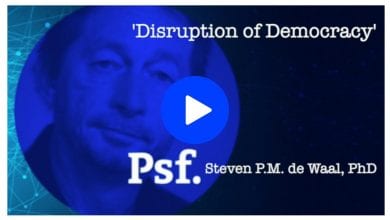Disruptive citizenshipCalendar-archiveHighlights
Lecture at Public IT conference Copenhagen, ‘The Disruptive Citizen’
Conference hosted by Management Events

The 600Minutes Public IT conference hosted by Mangement Events paves the way for digitalization and explores the multifaceted possibilities of data in the public sector.
I was asked to lecture about my recent books.
The value of civil leaders
I worked with Management Events in the past, especially with lectures on national systems and new developments in health care. I still lecture on these issues in Dutch courses. My current main subject has changed to civil leadership. My first book on this subject was also my dissertation, and is titled: ‘The Value(s) of Civil Leaders (Eleven 2014). The second is a book in Dutch about Civil Initiative and Civil Power, introduced by me in Dutch newspapers as the rise and power of the disruptive citizen.
“The disruptive citizen is here to stay”
My lifelong interest, starting with lectures and books in the 90s, is the value and impact of ‘private for public‘. How can and will private persons and organizations, non-profit and for-profit alike contribute to the common good or public value? In my analysis this is still a strong societal force, despite the egoism a lot of economists preached and besides a lot of politicians who meant the state would be better equipped for this. Modern terms for this phenomenon are ‘social entrepreneurship’, ‘civic initiative’, ‘social responsibility’, ‘social impact creation’.
In Holland it was historically called private initiative, and more than 100 years ago stood health care (insurance and supply), education, public broadcasting and pension insurance at the basis of social housing.
There are several reasons this force is growing and the disruptive citizen is here to stay. Cut-backs on welfare arrangements and failures in execution seem the most obvious. But beneath these I think there is a much more dominant factor. The technological change that creates disruption in the market (the platform economy that facilitates new competitors), is also influencing the attitude and possibilities of citizens towards politics and public sector. They are trained in the modern ICT techniques to exercise and feel the power they have on data, information, communication and learn to use it in mutual exchange, in formulating and cumulating their opinion, in power to protest or complaint, ultimately leading to a feeling they are in charge of their own lives. They feel strongly: why will this stop in healthcare, education, energy production, even politics?
“Governments must learn to listen”
Powerful citizenship values are causing structural changes
In my analysis this strong force, arisen from citizenship values, both in individuals and in boardrooms, was still existent in Western countries and is now again growing because of these structural changes. Its biggest impact will be on governments, who must learn to listen and partner instead of rule and direct, on public services, who must learn to coproduce with these initiatives. In the end its biggest impact will be on professional management, who must learn to lead in terms of public values and co-producing citizens.
I will lecture on this in Copenhagen. I most certainly look forward to the debate about the possibilities for change that will facilitate the disruptive citizen in Denmark.
Download presentation here



